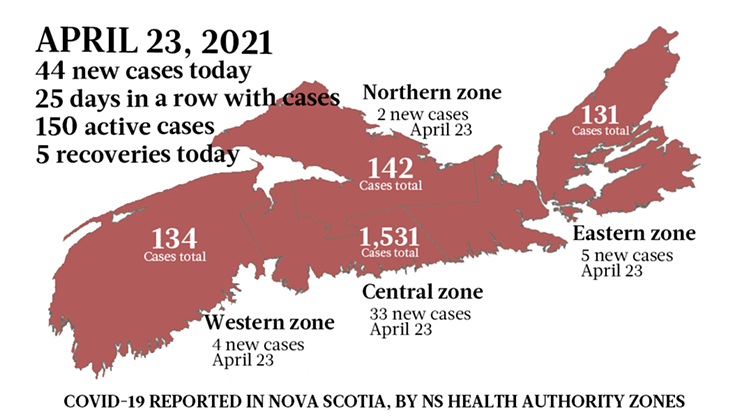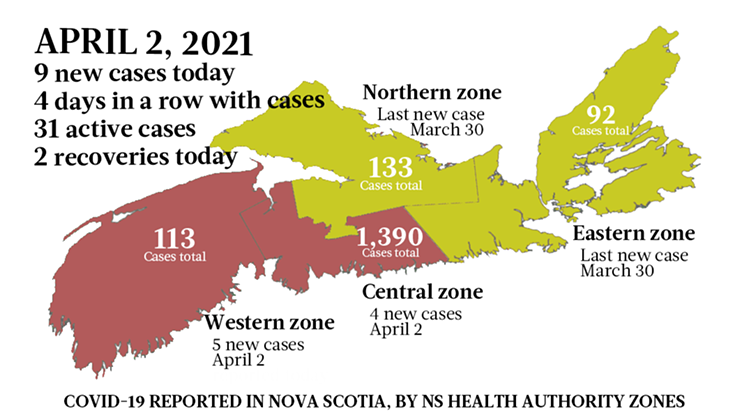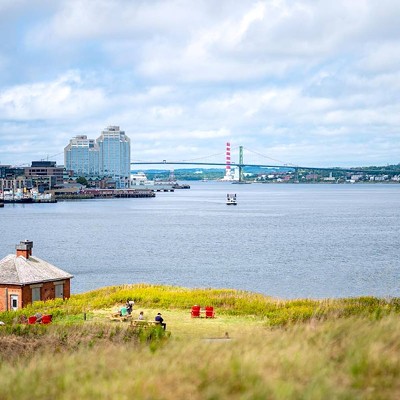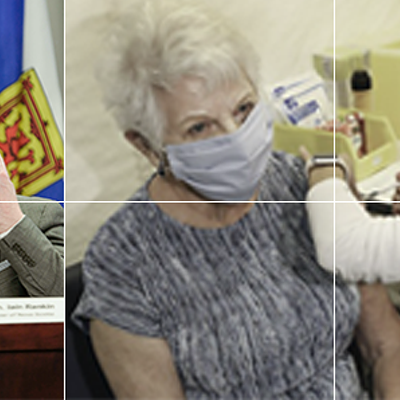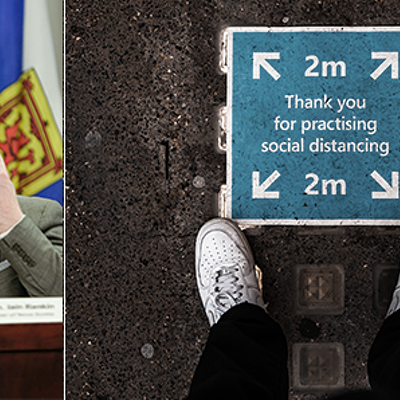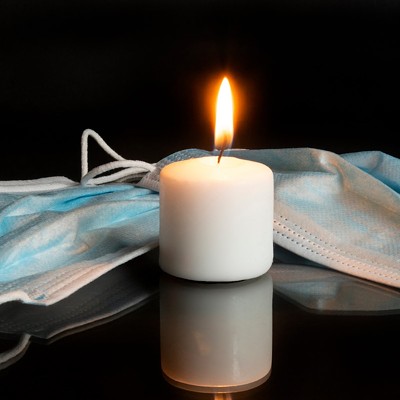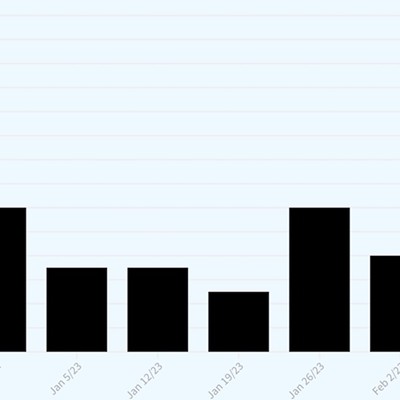It was just last Tuesday, February 23, that Iain Rankin was sworn in as premier, and he gave his debut public COVID-19 briefing the next day, taking former premier Stephen McNeil’s place beside chief medical officer of health Robert Strang. Nova Scotia’s new pandemic power duo didn’t announce any major changes at that first briefing, but then infection numbers started climbing. Two days later, at their second briefing, they took action, imposing what Strang called a “circuit breaker” in Halifax and some surrounding areas–limitations that would last until at least March 26, if not longer, because of the recent spread of the two highly infectious COVID-19 variants in the province.
Strankin moved quickly, making the announcement Friday afternoon for restrictions on travel and activities to take effect Saturday morning, 8am. And people responded quickly. Fearing the worst, many Nova Scotians cancelled spa trips, hockey tournaments and family visits, some still weeks down the road. Dozens of Haligonians forfeited deposits on their March break staycations to Cape Breton, the south shore, or in and out of HRM.
I was just thinking....I have an appointment at the SenSea Nordic spa soon. Due to the current restrictions around moving about between areas I may not be able to attend. Anybody know when the next provincial briefing is being held?
— Lyne (@lynesworld) March 4, 2021
I hope you’re able to go! I had to cancel my Sensea visit for last weekend 🙁
— Jodi Hunt (@jodihunt) March 4, 2021
Organizations like Halifax’s Neptune Theatre, Symphony Nova Scotia and the Halifax International Boat Show were forced to cancel events due to the new gathering limits and rules against in-person audiences.Once again we have to cancel our hotel and other reservations and we are very happy to do our part. We've benefited from Nova Scotia's COVID response by being able to live a close to normal life. In the big scheme of life a very small sacrifice.
— Bruce (@bruce_) February 26, 2021
Dear friends and supporters
— Neptune Theatre (@NeptuneTheatre) February 26, 2021
Following today’s announcement with the new restrictions to spectator events, Neptune Theatre must postpone our Reunited concert and play reading series to later dates.
Stay tuned for new show dates!
More Info: https://t.co/Rc0h5z0L37#Halifax pic.twitter.com/fIIIqXLI41
Following on last week’s increased COVID-19 restrictions in our province, Symphony Nova Scotia has cancelled or postponed all in-person public events through to March 27, 2021.
— Symphony Nova Scotia (@SymphonyNS) March 2, 2021
Read our full statement: https://t.co/xIyu3WFU9P
But now Strang and Rankin have flip-flopped.HALIFAX INT BOAT SHOW TO BE POSTPONED
— Halifax Boat Show (@halifaxboatshow) March 1, 2021
For Immediate Release
Issued: March 1, 2021
Halifax, NS – On Friday afternoon, Nova Scotia Premier Iain Rankin and Dr. Robert Strang, Chief Medical Officer of Health, announced tighter COVID-19 restrictions in the province. 1/6 pic.twitter.com/ZsrbOiVR2D
“Many restrictions that came into effect on Feb. 27, such as restaurant hours, sport competitions, culture performances and non-essential travel, will end,” says a release issued today by the province.
As of tomorrow, Friday, March 5 at 8am, just six days of restrictions later, we’ll return to nearly the same C19 rules that were in effect before last weekend. People can travel into and out of Halifax, sports games and in-person arts performances are allowed to happen, restaurants don’t have to close an hour early, weddings and funerals can have up to 100 attendees indoors. (The restrictions that remain in place in HRM are no wedding receptions or funeral visitations, and only two approved caregivers are allowed into long-term care homes.)
Although Strankin’s four weeks was only one week in reality, Strang has said many times during Covid that he’d rather under-promise and over-deliver, than the reverse. And in today’s release, Rankin is quoted saying, "I know that restrictions can have a significant impact on businesses but safety is always the first priority.”
Whether or not you agree with it, this circuit breaker format may soon be the new normal. Gatherings and events may be cancelled on short notice if there’s a spike in cases. Then, once public health and the government feel it’s safe enough, we open back up.
This time around, the early reopening can likely be chalked up to the 25,000+ Nova Scotians who were tested over the past six days, and the low case count that resulted from it. If we’d discovered 500 or even 50 cases resulting from those thousands of tests–rather than one to three each day–we might not be reopening so soon.
"Thank you to all the Nova Scotians who turned out for testing over the past week," Strang is quoted as saying in the release today. "These record numbers helped give us a bigger picture of the virus in HRM and elsewhere in the province. It was critical to this decision."
A similar circuit breaker was implemented on PEI last weekend after cases spiked to 22, the highest on the island since the pandemic began. Schools were closed to students, and restaurants shut entirely to in-person dining. But premier Dennis King said he was comforted to know that 11,000 tests were conducted over the weekend once the circuit breaker was put in place, and restrictions were eased as of today.
Other places like Australia, Wales and Singapore have implemented circuit breakers, and the phrase swept through Europe in the fall, making its way into the new pandemic vocabulary. According to the BBC, the circuit breaker’s main intent is to “reverse the tide of the epidemic and bring the number of cases down.” While it’s similar to a lockdown, “crucially a circuit-breaker is for a fixed period of time.”
Whether it’s connected to the power supply in your home or to rules on public movement, a circuit breaker is useful in an emergency because it can be flipped on and off at a moment’s notice. But for the arts industry, the restaurant sector, sports tournaments and anyone planning a major life event, it’s not so easy to cancel or postpone on a moment’s notice, and the good news of the lockdown being lifted early might feel more like chaos.
In today's press release, Strankin promises to “address the easing of restrictions in more detail” at tomorrow’s C19 briefing. The tension between plan making and circuit breaking will definitely, for sure come up. Or maybe not.



